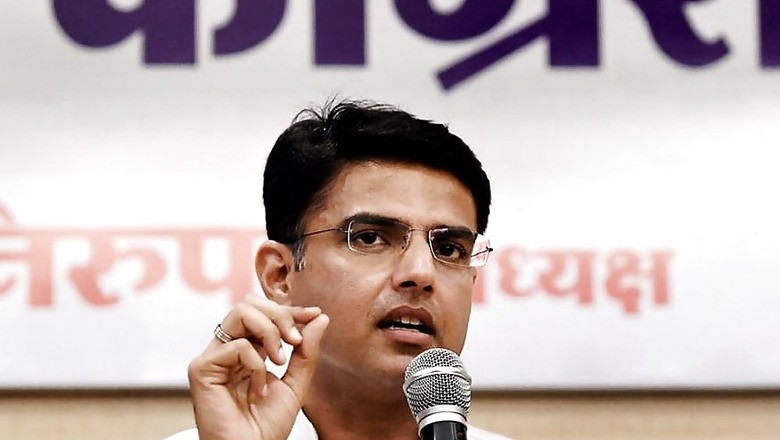
views
Sachin Pilot has proved that he is a chip off the old block. Several years ago, his father Rajesh Pilot took on the Congress old guard and won. The wheel has come full circle, with his son and political heir raising the flag of rebellion.
Rajesh Pilot challenged the Congress leadership in his 16th year in active politics. So it is with Sachin, who became an MP in 2004.
Pilot Sr was a great believer in inner-party democracy and had the self-confidence to stand up to the party leadership. Sachin displays the same courage of conviction, although there are differences in approach and style.
For one thing, Pilot Sr was a self-made man and proud of it. A 'dudhwala' (milkman)-turned-Indian Air Force pilot, he achieved political success at a relatively young age. He became a minister at 40, with two Lok Sabha victories already under his belt. Sachin reached that milestone at 35, riding on his father's legacy.
Back in early 1990s, the feisty, hearty and breezily confident Rajesh Pilot openly turned up his nose at Congress veterans Arjun Singh, SB Chavan & Co. He declared that had he been in charge, the Babri Masjid debacle would never have taken place.
He was prominent among those who challenged the then Congress president, PV Narasimha Rao. A measure of his courage was his relentless campaign against Rao's confidante and advisor, the controversial godman Chandraswami, who wound up in Tihar jail as a result.
Pilot Sr was as fearless as he was forthright. Over the years, he learnt to keep his cards to himself, but continued to be outspoken. Fond of media attention, he enjoyed convivial chats with journalists under the shade of an old tree in his backyard. He was not a stereotypical politician and survived thanks to his clean image and widespread popularity.
Sachin, an MBA from Wharton and a child of relative privilege, is more circumspect and less enamoured of the spotlight. He is every bit as affable as his father, but not given to blurting out opinions. In his maiden stint in the Lok Sabha, he asked only one question and took part in just about a dozen discussions, although he was rarely absent from the House.
Sachin is articulate but chooses his words carefully and can address the student body at the London School of Economics with the same assurance that he speaks to his constituents. That he is taken seriously by his Gen X colleagues was evident when Milind Deora proposed his name for Congress president.
Although he entered politics with the Pilot surname (and lives up to it thanks to an aviation licence), Sachin is not quite a son of the soil. He had to work hard to make the crucial connect with the rural heartland. Unfortunately, the family pocket borough of Dausa became a reserved seat, compelling him to move to Ajmer, where he had to start from scratch.
Sachin's labours paid off when the Congress got a near-majority in 2018. He was hailed as the architect of the victory and it was generally felt that he deserved to become chief minister, but the smart money was on Ashok Gehlot. The wily veteran held the balance of power in a hung house.
Willy-nilly, Sachin accepted the post of deputy chief minister, knowing full well that he would undermined by his boss at every turn. Matters got so tense that even non-partisan partymen were afraid to be seen with him, lest word got back to Gehlot.
At one time in the late 1990s, Pilot Sr and Gehlot were young turks on the same side of the fence. Today, Gehlot represents the old guard and Sachin is the young turk, with the same capacity for hard work, self-confidence and willingness to take a stand as his father.
Pilot Sr opposed the coterie who ran the 'Sonia Congress' after she took over in 1998, but he did not join the trio of Sharad Pawar, Purno Sangma and Tariq Anwar when they threw down the gauntlet to Sonia during a CWC meeting in May 1999. In fact, on that fateful day, Sangma kept waiting for Pilot and Jitendra Prasada to show up at his house!
Later, Pilot Sr explained that it made more sense for him to remain an insider and work against the coterie and for inner-party democracy. Along with Prasada, he managed to attract a considerable following within the party. By 2000, he was ready to present himself as a candidate for Congress president, but died in a tragic road accident in June of that year.
Rajesh Pilot did not want to quit the Congress, but demanded his due and was willing to fight for it.
Sachin is in exactly the same position. The Congress leadership should have understood.
(The author is a senior journalist. Views expressed are personal.)



















Comments
0 comment